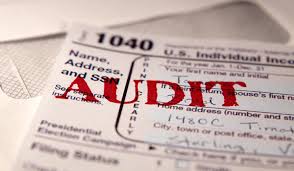Here are ten of the most common ways to bring your personal return to the attention of the Internal Revenue Service.
- Incomplete or sloppy returns — Math errors and missing information prompt scrutiny, as you’d expect. If the IRS computer can’t make sense of what you’ve filed, a human has to check to find the mistake. This is one reason to file electronically: computers help to catch bonehead errors.
- Unreported income — This is a no-brainer. If you file a return but fail to report income received, you’re heading for trouble. All of your interest, dividends, and miscellaneous incomemust be reported. Remember: everyone who sends you a 1099 is also sending one to the IRS.
- Suspiciously low income — If you’re making much less than others in the same profession, that raises a flag.
- Having a high income — Though fewer than one-percent of taxpayers are audited each year, those making over $100,000 are five times more likely to come under scrutiny. “Higher income earners are more likely to be audited because there is more tax money at stake,” says Eric Tyson, an author of several Taxes for Dummies books. “The IRS is a business, they have employees and they do not have time to let them audit people if they are only going to earn $2 worth of tax.”
- Drastic changes in income — Unexplained fluctuations in income can indicate that something was underreported somewhere. Most people don’t have income that swings wildly up-and-down, and the IRS knows it.
- Round numbers — It’s unlikely that your investment returns were exactly $500, or that your mortgage interest deduction was $10,000. Too many round numbers on a return are a symptom that something fishy may be going on.
- Too many charitable contributions — Charity is good, but too much charity can raise a red flag. If the average person in your income bracket donates about $1000 to charity and you claim you donated $5000, you’re going to increase the odds of an audit. Be sure to save your receipts!
- Participating in tax scams — The IRS is trained to deal with common evasion attempts.
- High itemized deductions — Again, anything too far from the averages is likely to bring your return to the attention of the IRS. There’s nothing wrong with claiming all of the deductions to which you are entitled, but be aware that if you have a lot of itemizations, you’re more likely to be audited.
- Disagreements between state and Federal returns — This is another example of how sloppiness can hurt you. Be sure that your information matches on both your state and Federal returns.
Having a small business is itself a flag of sorts. Some people use small businesses as a tax dodge, a way to write off expenses, and so the IRS keeps a close eye on small-business owners.
- Being self-employed — Filing a Schedule C isn’t a guarantee that you’ll be audited. But, as my accountant told me the other day, the IRS doesn’t like to see “a small Schedule C that you continue to show losses on while you have a regular job”. For more information, check out this IRS page: Is it a business or a hobby?
- Home offices — There have been several articles on major sites recently touting the tax advantages of a home office, but you’ve got to be careful. This is a huge red flag. For more information, here are some home office deduction reminders from the IRS web site.
- Family members on the payroll — One common tax dodge is to “hire” a family member in order to take more money out of a business. There’s nothing wrong with employing family members as long as they’re actually working.
- Unlikely business deductions — It can be tempting for small-business owners to claim new “toys” as business deductions. That Nintendo Wii? Not a business expense unless you’re reviewing games with the intention to make a profit. That trip to New York? Not a business expense unless it serves a legitimate purpose. Don’t try to play cute.
- Excessive entertainment deductions — This is one that has me worried. I’ve only just recently begun to take people out to lunch with my business card. I’m careful to only use this card if we’re actually discussing something related to writing or blogging, but even so I wonder if I ought not just pay out of personal funds.

 RSS Feed
RSS Feed
